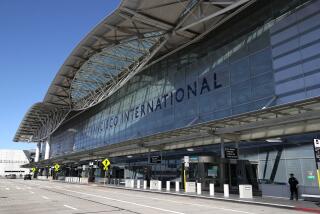Keyed to Romance : Vocalist and pianist Michael Feinstein finds timelessness of old songs holds tremendous appeal for modern audiences.
- Share via
GLENDALE — The fact that Michael Feinstein’s concert Sunday evening at the Alex Theatre will include music for Valentine’s Day seems a bit redundant. After all, as he says, “I’m known for romantic music, anyway.”
Indeed. Since he first gained prominence in hotels and supper clubs in the mid-1980s, many critics have credited Feinstein with reviving a romantic style of singing and piano playing via his respectful yet stylish performances of music by such classic popular composers as George and Ira Gershwin, Irving Berlin, Jerome Kern and Cole Porter. Sunday’s concert continues that tradition, with some contemporary repertoire as well.
Rather than the orchestral backup he has used at other recent local appearances, his first performance at the Alex will feature Feinstein solo at the piano. “In some ways I like that better, because it gives me more freedom,” he says. “There will be informal chat, and fun, heartwarming music.”
Feinstein’s personal reverence for the songs of the 1920s, ‘30s and ‘40s is no longer the novelty it was a decade ago. But what appeal does he feel such songs hold for the modern audience at large?
“The same thing that Beethoven holds, that Shakespeare holds, that Picasso holds,” he replies readily. “Timelessness. They transcend the time in which they were created and have a universal meaning, a message that makes them last. The songs in many cases are old, but they provide cathartic experiences, certain emotional sounding boards that allow people to sort of cleanse their souls.
“The songs are becoming more popular with audiences today, because they’re about simple basic human emotions,” he adds. “They’re not cluttered with complexity, though they are about complex things.”
And even old songs can have new twists, such as the rarely performed lyrics that Feinstein, 38, delights in discovering and sharing. His 1993 recording, “Michael Feinstein Sings The Jerry Herman Songbook,” for instance, contains certain of Herman’s choruses for “Hello, Dolly!” that were never utilized in the stage and film musical.
“There’s a bit of preservation,” he says. “I love the research part, the archeology. When I sing, ‘If I Only Had a Brain’ (from ‘The Wizard of Oz’), people say, ‘Where did you get those lyrics?’ And I say, ‘Right there, in the sheet music.’ And it’s fun to do the verses of songs, because a lot of times people don’t know what’s coming.”
*
Then, too, he might create fresh arrangements. “I don’t have a system,” he explains. “I usually just sit down at the piano and start fooling around and see where it takes me. Sometimes it’s fiendish, difficult work to build an arrangement that works.” He cites a well-received version of “Alexander’s Ragtime Band” that he fashioned 10 years ago. “I came up with a fast section and then pulled back at the end. It took a couple of hours at the piano, which is a long time for me.”
A long time, at any rate, for someone who learned to play piano by ear as a 5-year-old. Growing up in Columbus, Ohio, Feinstein was exposed early on to popular music by his parents, amateur performers both, and felt an immediate connection with it.
In 1976, at age 20, he moved west, to Canoga Park. A meeting with the widow of pianist Oscar Levant led to a 1977 introduction to lyricist Ira Gershwin. Feinstein spent years cataloguing Gershwin’s musical collection, along the way meeting other famed songwriters and performing at Gershwin’s parties.
After Gershwin’s death in 1983, he began performing in piano bars and convalescent homes--nowadays he regularly entertains at the Jewish Home for the Aging in Reseda--and private parties. A friendship with Liza Minnelli opened Hollywood’s doors, with a critically acclaimed debut at New York’s Algonquin Hotel following in 1986.
One who has admired Feinstein since his Gershwin years is Rosemary Clooney, who has performed with him at the Hollywood Bowl and other stages as well as on television.
“He’s a very good musician,” she says. “He cares very much about the words. And he’s an honest performer. If he makes a mistake, he’ll be funny about it. He’s very kind, too. He takes care of his friends. I had a bout of pneumonia over the holidays, and he made a point of calling me every day. My own children didn’t do that!”
Besides concertizing, Feinstein has been busy composing and recording music. He provided the music for the title song of the CBS television film, “For Love Alone,” tentatively scheduled to air in April, and also appears on screen. His next album, a collection of sad love songs titled “Such Sweet Sorrow,” is due out March 28. He is also working on the latest in his “Songbook” series, which focuses on Hugh Martin of “Meet Me in St. Louis” fame. And a book of his reflections about songwriters, “Nice Work If You Can Get It,” will be published in October by Hyperion Press.
As for his Alex Theatre concert, Feinstein has more than just entertainment on his mind. “I am involved in music for the purpose of transformation,” he says. “I hope the people have a good time, but I hope they recognize the grace and the healing power of music. I hope that it will move them on a deeper level.”
(BEGIN TEXT OF INFOBOX / INFOGRAPHIC)
WHERE AND WHEN
Who: Michael Feinstein. Location: Alex Theatre, 216 N. Brand Blvd., Glendale. Hours: 7 p.m. Sunday. Price: $28 to $45. Call: Alex box office at (818) 243-2539 or Tele-Charge at (800) 233-3123.
More to Read
The biggest entertainment stories
Get our big stories about Hollywood, film, television, music, arts, culture and more right in your inbox as soon as they publish.
You may occasionally receive promotional content from the Los Angeles Times.










